Alienware 17 Gaming Notebook Review
by Dustin Sklavos on September 6, 2013 12:00 PM ESTWe're starting to get a bit more of a feel for how Haswell performs on the CPU side. The Intel Core i7-4800MQ powering the Alienware 17 is undoubtedly one of the fastest mobile quad core CPUs, but the more testing I see with it, the more I get a distinct sense that we need to start digging deeper into how it handles turbo. Performance is complicated further when we start hitting the GeForce GTX 780M as well; NVIDIA has implemented boost clocks on their mobile part, but the boost range seems to be a lot more variable than it is on the desktop, probably owing to the more specific thermal headroom.
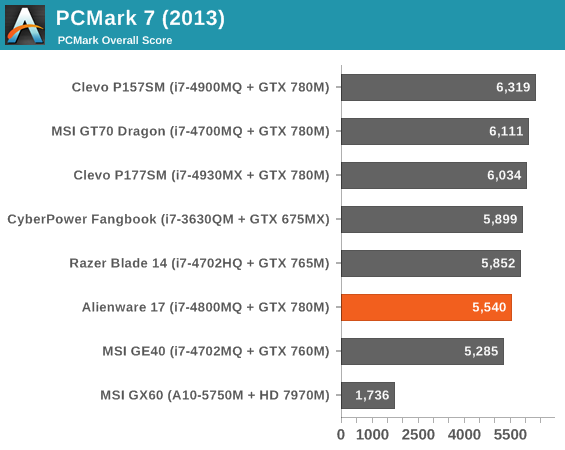
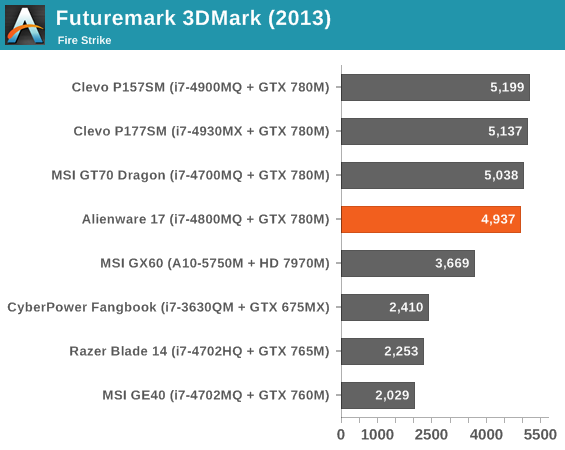
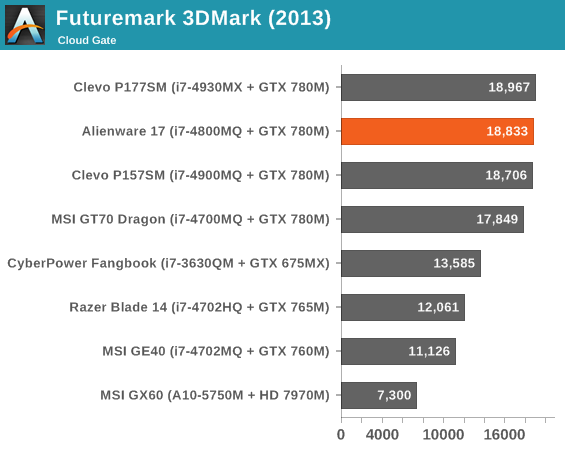
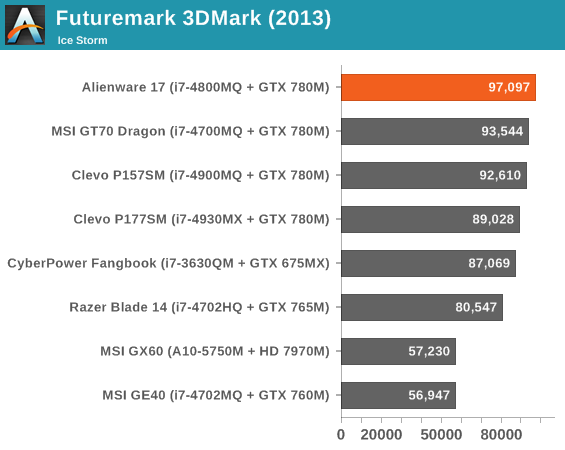
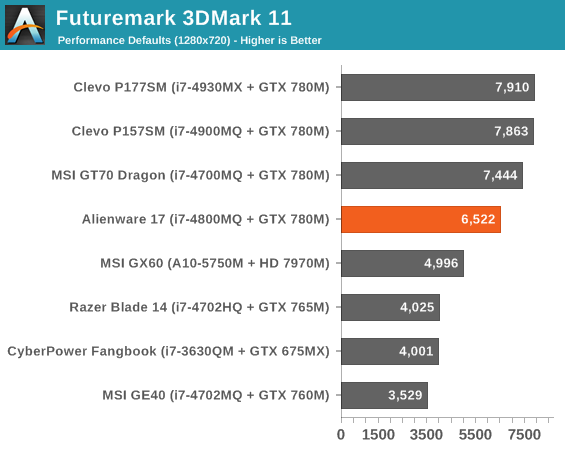
You can see we've got four different Haswell and 780M systems on hand, and the 3DMark scores are bouncing all over the place. I'd been expecting and hoping that the Alienware 17 would have the cleanest and most consistent implementation of this hardware pairing, but that doesn't seem to be the case. Instead we're all over the map. The 3DMark11 score is remarkably low compared to the other 780M systems, but it remains to be seen whether or not that performance deficit will resurface in practical game testing.
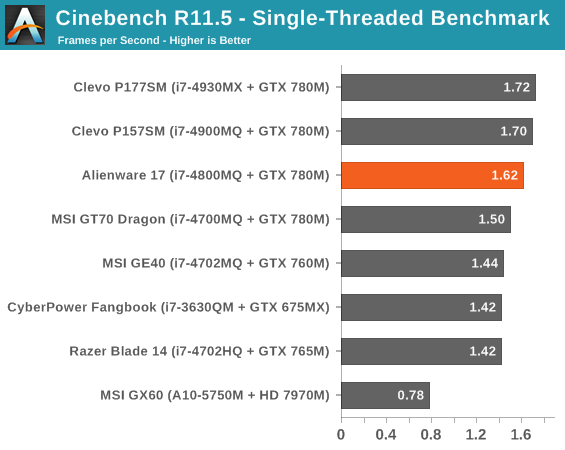
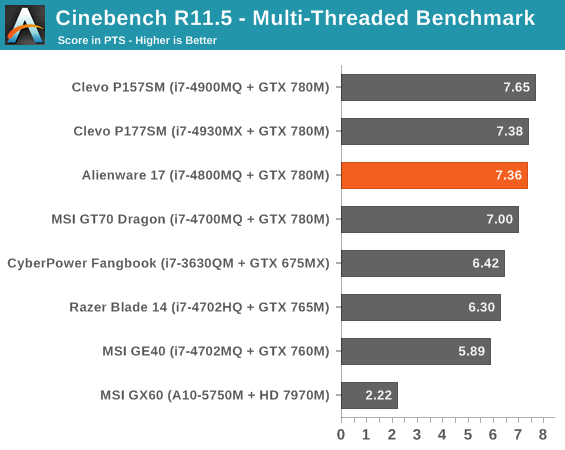
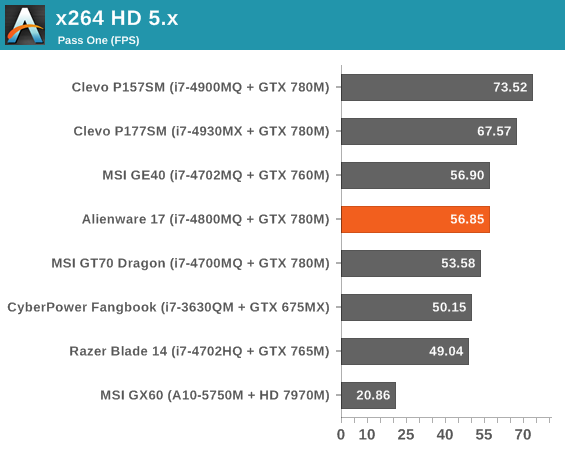
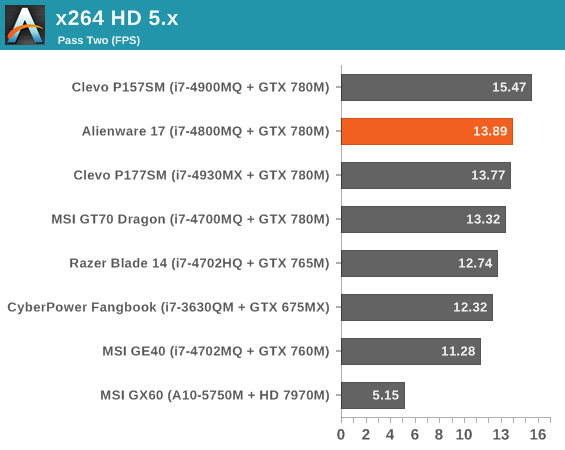
Cinebench is able to give us consistent results due, I think, to its more sustained load. Cinebench has historically been very consistent in the first place, so everything falls in where it ought to. But the x264 encoding benchmark is completely different.
We're essentially dealing with a lot of performance variables now. At first blush, Haswell seems to be more granular with its performance scaling than Ivy was. Mobile Kepler with boost is also very granular, but my experience with Kepler on the desktop is that its boost clocks are governed entirely by thermals. On the desktop, thermally-controlled turbo/boost speeds on hardware are easy to control for, but when you're talking about notebooks, you're at the mercy of the cooling systems implemented by the manufacturer, including the fan profiles.










45 Comments
View All Comments
kogunniyi - Friday, September 6, 2013 - link
Oh, and Dell's NBD warranty.nerd1 - Friday, September 6, 2013 - link
Personally I think it should be more sensible to just get last gen model with 680M and save $1000. I prefer the old design and keyboard, and 680M is still no slotch even compared to 780M.xenol - Friday, September 6, 2013 - link
No temps, noise, or the like?Drumsticks - Friday, September 6, 2013 - link
It's amazing how you can write "the progress is palpable" for the exact same thing! Haswell) in an ultra book review and an alien ware review and have it mean the same thing.Drumsticks - Friday, September 6, 2013 - link
Different things* no edit :(inighthawki - Friday, September 6, 2013 - link
Anyone else ever wish there were baselines of desktop models to compare against? I've never purchased a gaming laptop before, so it'd be really cool if I could see the difference between the two. Like, how much slower is a 780M than a GTX780, or a 7970GE. I know they're significantly less powerful, but it'd be nice at some points to see by how much rather than just comparing to a bunch of similar classed laptops.JarredWalton - Friday, September 6, 2013 - link
780M is going to be more like a GTX 680 with lower clocks, and performance will also be a bit more variable thanks to the thermal constraints. If you're after bang for the buck, gaming notebooks have never been a good choice; we figure anyone looking for a new gaming notebook is looking for a new gaming notebook -- they don't need to see how much faster a desktop that costs less will be. Or if they do, they can do a bit of research on their own -- our system benchmarks and desktop benchmarks are using the same core tests (other than battery life, of course), though the lack of higher resolution tests on notebooks makes it a bit trickier.If you want a couple links, though:
http://www.anandtech.com/bench/product/984
http://www.anandtech.com/show/7098/2
I've taken the Enthusiast gaming scores and compiled them into a single image, showing performance differences between the Alienware 17 and an overclocked GTX 680 and stock GTX 780 (with overclocked CPUs on both as well). Here's that image (hopefully the link works):
http://images.anandtech.com/doci/7284/Alienware%20...
Short summary: the desktop 680 OC is 12% to 60% faster than the AW17, with an average increase of 33%. The desktop 780 is 32% to 77% faster, with an average increase of 53%. StarCraft II is the game that shows the smallest improvement, being largely CPU limited even with OC'ed desktop CPUs. Metro Last Light shows the greatest improvement, followed by Tomb Raider and then Bioshock.
nerd1 - Friday, September 6, 2013 - link
Recent laptops are quite good up to 1080p. 680M or 7970M can run pretty much anything on 1080p, and cheaper one like 765M can run most games on 1080p, except for metro or crysis series maybe.waldojim42 - Sunday, September 8, 2013 - link
I actually play Crysis 2 on my AW 14 just fine. Have to use the "Extreme" preset rather than "Ultra", but 1080P is no problem.brucek2 - Friday, September 6, 2013 - link
Actually Jared I'm not sure at all that the difference between desktop and mobile parts is well understood by the mass of computer purchasers. Certainly the manufacturers are not helping by reusing the same product names, a practice I feel is dishonestly misleading. Its something I have to explain to my less technical friends frequently, the last time being not three days ago.Anyway, that's a long way of saying I actually think it would be a great service if reviews could attempt to assign a dollar premium for mobility so potential purchasers understand how much they are paying for the privilege and/or how far down the performance curve they are limiting themselves. In the case of the talk from three days ago, the upshot was the friend realized a desktop would be the better choice after all.